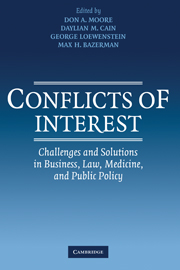Book contents
- Frontmatter
- Contents
- List of Contributors
- Acknowledgments
- Introduction
- PART ONE BUSINESS
- 1 Managing Conflicts of Interest within Organizations: Does Activating Social Values Change the Impact of Self-Interest on Behavior?
- 2 Commentary: On Tyler's “Managing Conflicts of Interest within Organizations”
- 3 A Review of Experimental and Archival Conflicts-of-Interest Research in Auditing
- 4 Commentary: Conflicts of Interest in Accounting
- 5 Bounded Ethicality as a Psychological Barrier to Recognizing Conflicts of Interest
- 6 Commentary: Bounded Ethicality and Conflicts of Interest
- 7 Coming Clean but Playing Dirtier: The Shortcomings of Disclosure as a Solution to Conflicts of Interest
- 8 Commentary: Psychologically Naive Assumptions about the Perils of Conflicts of Interest
- PART TWO MEDICINE
- PART THREE LAW
- PART FOUR PUBLIC POLICY
- Index
- References
5 - Bounded Ethicality as a Psychological Barrier to Recognizing Conflicts of Interest
Published online by Cambridge University Press: 04 August 2010
- Frontmatter
- Contents
- List of Contributors
- Acknowledgments
- Introduction
- PART ONE BUSINESS
- 1 Managing Conflicts of Interest within Organizations: Does Activating Social Values Change the Impact of Self-Interest on Behavior?
- 2 Commentary: On Tyler's “Managing Conflicts of Interest within Organizations”
- 3 A Review of Experimental and Archival Conflicts-of-Interest Research in Auditing
- 4 Commentary: Conflicts of Interest in Accounting
- 5 Bounded Ethicality as a Psychological Barrier to Recognizing Conflicts of Interest
- 6 Commentary: Bounded Ethicality and Conflicts of Interest
- 7 Coming Clean but Playing Dirtier: The Shortcomings of Disclosure as a Solution to Conflicts of Interest
- 8 Commentary: Psychologically Naive Assumptions about the Perils of Conflicts of Interest
- PART TWO MEDICINE
- PART THREE LAW
- PART FOUR PUBLIC POLICY
- Index
- References
Summary
But there is a more subtle question of conflict of interest that derives directly from human bounded rationality. The fact is, if we become involved in a particular activity and devote an important part of our lives to that activity, we will surely assign it a greater importance and value than we would have prior to our involvement with it.
It's very hard for us, sometimes, not to draw from such facts a conclusion that human beings are rather dishonest creatures…. Yet most of the bias that arises from human occupations and preoccupations cannot be described correctly as rooted in dishonesty – which perhaps makes it more insidious than if it were.
– Herbert A. Simon, 1983, pp. 95–96Herbert Simon's perspective (1983) is broadly compatible with Moore, Loewenstein, Tanlu, and Bazerman's (2003) recent research on the psychological aspects of conflict of interest in the context of auditor independence. Moore et al. (2003) focus primarily on the work on self-serving interpretations of fairness. The current work broadens this theme, and develops a conceptual framework for understanding how unchecked psychological processes work against an objective assessment and allow us to act against personal, professional, and normative expectations when conflicts of interest exist.
- Type
- Chapter
- Information
- Conflicts of InterestChallenges and Solutions in Business, Law, Medicine, and Public Policy, pp. 74 - 95Publisher: Cambridge University PressPrint publication year: 2005
References
- 198
- Cited by



